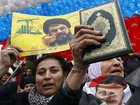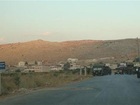Hizbullah has ramped up its support for the Syrian government, sending in military advisers to aid the regime of President Bashar Assad in the bloody struggle against the opposition, U.S. and Lebanese government officials said.
The Washington Post quoted Lebanese officials as saying that the support has markedly increased since a July 18 bomb attack in Damascus that killed four senior security officials, including Assef Shawkat, Assad’s brother-in-law.
 Full Story
Full Story
More than 305 people were killed across Syria on Wednesday, making it the bloodiest single day of the 18-month revolt, the Syrian Observatory for Human Rights said.
"This is the highest toll in a single day since March 2011. And this is only counting those whose names have been documented. If we count the unidentified bodies, the figure will be much higher," Observatory director Rami Abdel Rahman told Agence France Presse.
 Full Story
Full Story
Iranian President Mahmoud Ahmadinejad said Wednesday that Tehran was working to set up a separate contact group on the conflict inSyria, in a move unlikely to be welcomed by many nations.
"We do believe that through a national dialogue and a national understanding and consensus, they can, the various Syrian sides, reach a more solid conclusion, a more tangible and long-lasting conclusion," the Iranian leader told a press conference in New York.
 Full Story
Full Story
A Syrian rebel commander and a group of fighters told an opposition meeting on Wednesday they had decided to abandon the insurgency against President Bashar Assad and return to the regular army.
"We have decided to return to the army and cooperate with the Ministry of National Reconciliation," said Captain Khaled Abdel Rahman al-Zamel, speaking at a conference organized by opposition groups tolerated by Assad's regime.
 Full Story
Full Story
The Lebanese army discovered a training camp set up by a network in the mountain area between al-Bireh and al-Rafid towns in Rashaya, which is suspected of smuggling arms to neighboring Syria.
According to a report published in As Safir newspaper, the army raided the hideout after receiving information over the use of machineguns and automatic rifles in the area.
 Full Story
Full Story
Britain's Prime Minister David Cameron said Wednesday that the blood of children killed in the Syria conflict had become a "terrible stain" on the reputation of the United Nations.
Cameron's comments were the latest in an onslaught by Western leaders pressing Russia and China to lift their veto on U.N. action against Syrian President Bashar Assad.
 Full Story
Full Story
A rocket fired during clashes between Syrian regime forces and rebels exploded on the Israeli-occupied Golan Heights on Wednesday without causing casualties, the military said.
"A rocket fired in the morning during fighting inside Syria exploded on the Golan, without causing casualties or damage," an Israeli military spokeswoman told Agence France Presse.
 Full Story
Full Story
Syrian Ambassador to Lebanon Ali Abdul Karim Ali welcomed on Wednesday the national dialogue and Lebanese government's assertions that the Lebanese army should perform its duties in maintaining security along the border and pursue all who tamper with stability.
He said: “It's in Lebanon's interest to prevent the smuggling of arms to Syria and my country is not linked to all matters that target Lebanon's security.”
 Full Story
Full Story
More than 30,000 people, most of them civilians, have been killed in violence since the outbreak of a revolt against President Bashar Assad in March last year, a monitoring group said on Wednesday.
"At least 21,534 civilians, 7,322 soldiers and 1,168 defectors have been killed in the past 18 months," Syrian Observatory for Human Rights director Rami Abdel Rahman told AFP.
 Full Story
Full Story
A Syrian rebel commander has accused the West of being complicit in the "unprecedented massacres" committed by President Bashar Assad's forces by refusing to arm the rebels with anti-aircraft weapons.
Rebel officer Ahmed al-Fajj, a brigadier-general in the regular Syrian army before his defection "in the first days of the revolution," spoke in the rebel Free Syrian Army-held village of Atmeh on the Turkish border.
 Full Story
Full Story



